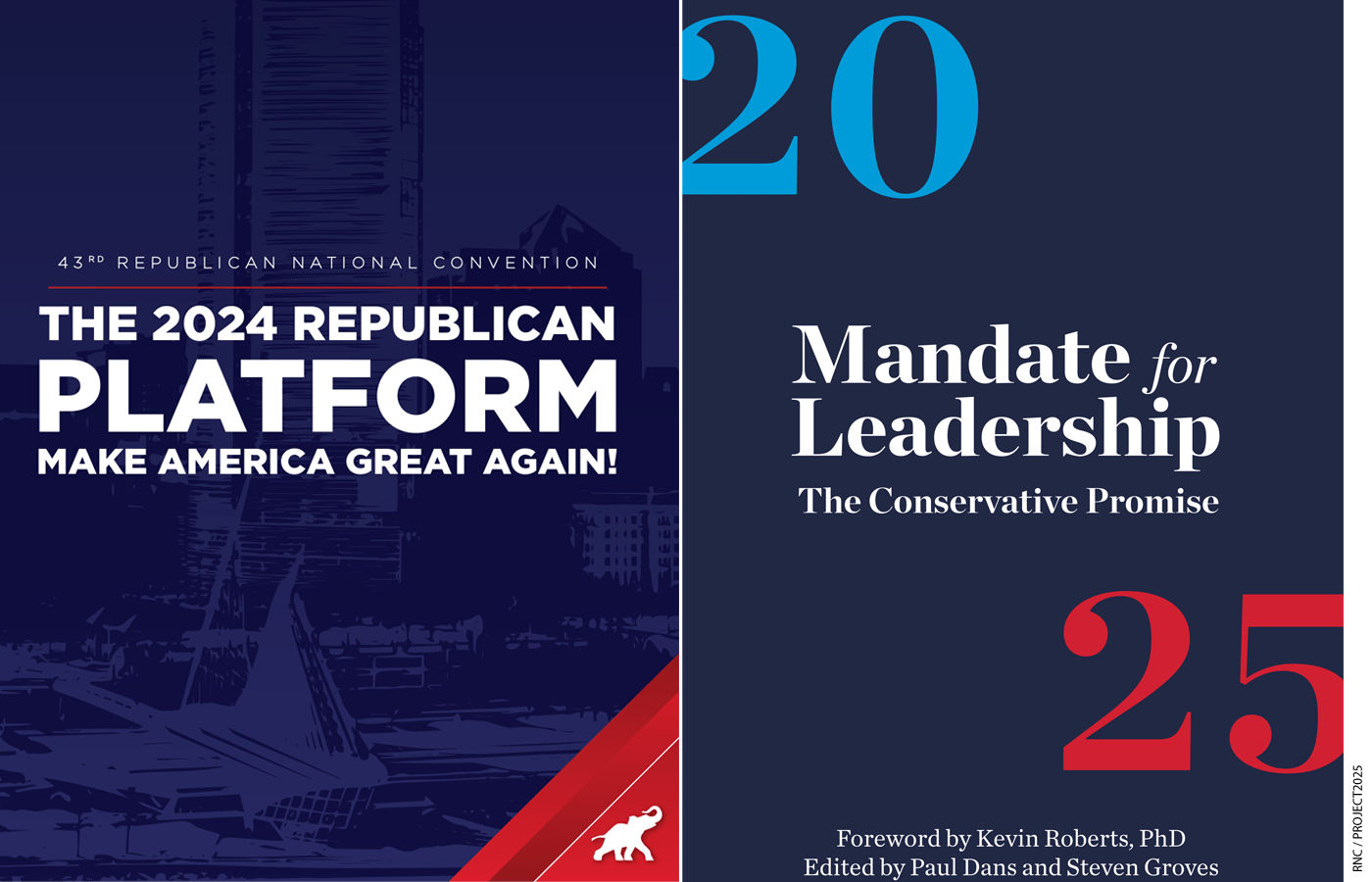Reflecting on the tenets that shape our educational practices is fundamental for …
Contrasting K–12 Education Policies: Republican Platform vs. Project 2025
Carlos Changemaker

Textbooks teach us that political parties seek power, interest groups defend their interests, and think tanks conduct research on policy-related subjects. These distinctions have always been somewhat fluid. Traditionally, parties have used platforms to secure electoral victories; think tanks have inherently had partisan leanings. However, the boundaries between these types of political bodies are more blurred today than ever before.
This election cycle, Democrats are accusing Donald Trump of running on a platform influenced by the Heritage Foundation, a conservative think tank known for its policy positions. They highlight that nearly 200 individuals involved in crafting Mandate for Leadership: The Conservative Promise, a 900-page report as part of the foundation’s 2025 Presidential Transition Project (Project 2025), served in the early Trump administration. The segment on education was authored by Lindsey Burke from Heritage, with input from former Trump administration members, including Jim Blew. Trump refutes the notion that Mandate guides his presidential strategies, dismissing it as merely a “policy advocates’ wish list” with “ridiculous and abysmal” suggestions.
The likely reality, to be known by future historians, lies between Democratic allegations and Trump’s disavowals. A comparison of the K–12 education content in the recently adopted party platform at the Republican convention with the K–12 recommendations in Mandate‘s education chapter reveals few contradictions between the two documents, although Project 2025 delves into significantly more detail than the convention-approved text.
The most apparent contrast is in the length of the two texts. The platform’s K–12 education section is succinct, whereas the Heritage education chapter spans over 40 printed pages. This disparity indicates the party aims to avoid statements that might hinder its pursuit of power, while the think tank seeks to translate that power into policies.
But does Heritage offer insight into the true essence of the vague language in the GOP platform? The answer is more nuanced than a definitive “yes” or “no.”
The party’s education segment is not devoid of meaning, despite containing generic statements like “back schools emphasizing Excellence and Parental Rights” and “prepare students for great jobs and careers.” These statements delineate clear differences with Democratic and Biden administration policies. Mandate presents numerous education policy recommendations, of varying magnitudes, some of which align with issues addressed in the platform. To evaluate the strength of Democratic accusations and Republican refutations, let’s examine how both documents approach six topics: federal spending, the future of the U.S. Department of Education, school choice, special education, civics education, and race and gender issues.
Federal Spending. Mandate advocates a robust stance on federal spending not explicitly mirrored in the Republican platform. The platform notes the U.S. tops spending on schools globally but doesn’t promise reductions in K–12 expenditure. In contrast, Mandate calls for eliminating various federal education programs to save nearly $20 billion annually and suggests phasing out compensatory education spending over a decade.
Abolishing the U.S. Department of Education. While the platform is silent on spending levels, it resurrects Reagan’s idea of closing the Education Department, without specifying alternatives. Mandate echoes this theme but proposes a gradual phase-out over ten years and suggests more effective agencies to handle related functions. It suggests transitioning to block grants to states and potentially allocating funds directly to parents for school choice.

Universal school choice. Since 1996, the GOP platform has consistently supported various forms of school choice but in 2024, it advocates for “universal school choice,” extending public funding to all families for their chosen school. The platform endorses education savings accounts and fair treatment of homeschoolers but doesn’t mention charter schools.
Mandate elaborates on these policies, emphasizing that redirecting federal education spending to families or providing tax credits for K–12 savings accounts could enhance education choice. It proposes expanding the D.C. school voucher program, easing charter school regulations, and giving compensatory education funds to low-income families for school choice.
Special education. While both political sides historically support federal special education funding, the platform’s silence on the Department of Education abolishment leaves this crucial program in question. Mandate suggests transferring the program to the Department of Health and Human Services.
Civic education. The platform favors schools teaching American principles and Western Civilization but commits only to restoring the 1776 Commission and opposing nationalized civic education. Mandate is less explicit on civic education, requesting a report on the effects of action civics on students’ understanding.
Race. Addressing race issues cautiously, the platform vows to defund schools promoting political indoctrination but lacks detail. Mandate delves deeper, opposing critical race theory and advocating for equality under the law without endorsing systemic racism.
Sex and gender. The platform opposes men in women’s sports, taxpayer-funded sex change surgeries, and schools promoting gender transition. Heritage echoes these views, seeking restoration of Title IX regulations and emphasizing traditional gender identification.
* * *
Comparing Heritage’s Project 2025 Mandate and the Republican Party Platform resembles contrasting narratives of Jesus’ life in Mark and John’s gospels. While they convey different depths, they can be interpreted as congruent. Democrats use the party platform to support claims that Mandate influences Trump’s potential policies, yet the detailed aspects in Heritage’s document are not fully reflected in the platform, allowing Trump to disavow any direct link.
Neither the platform nor Mandate offer definitive insights into the future of education under a Trump administration. Congressional composition, legal challenges, economic factors, and public opinion will shape education policy. However, together, the two documents suggest a smaller federal presence in K12 education, endorsement of school choice, reduced federal regulations, opposition to affirmative action, and reversal of Biden Administration policies. Yet, the U.S. Department of Education’s current location may remain unchanged.
Paul E. Peterson is the Henry Lee Shattuck Professor of Government and director of the Program on Education Policy and Governance at Harvard University. Feel free to share your reactions to this article by emailing paul.peterson@educationnext.org; your responses may be featured periodically.
The post Comparing the GOP Platform and Project 2025 on K–12 Education appeared first on Education Next.



